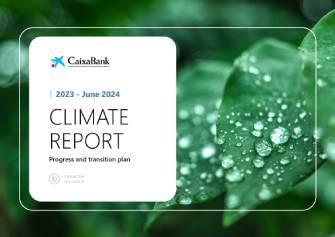 Caixabank (Go to Home)
Caixabank (Go to Home)Environment and climate strategy
We accelerate the transition to a carbon-neutral economy that promotes sustainable development and is socially inclusive
For CaixaBank, it is essential to drive the sustainable transition by guiding companies, individuals and society as a whole towards a carbon-neutral economy that promotes sustainable development.
For this reason, we have two high-level public commitments that establish our lines of action on climate and nature:
Environmental protection is one of our strategic priorities and we have an Environmental and climate strategy with the aim of contributing to this transition by financing and investing in sustainable projects, managing environmental and climate risk and reducing the direct impact of our operations.
Areas of action
Climate Report
It includes information on our global strategy and governance with regard to climate-related risks and opportunities, as well as data on our greenhouse gas emissions, both operational and from the financing and investment portfolio, and our decarbonization targets.

Decarbonisation targets
At CaixaBank we work with the aim of contributing to the transition to a carbon neutral economy by financing and investing in sustainable projects and supporting the sustainable transition of our customers.
As a founding member of the Net Zero Banking Alliance (NZBA), promoted by the United Nations, at CaixaBank we are committed to being carbon neutral by 2050 and we are working to move the portfolio towards zero greenhouse gas emissions1.
We have set intermediate emission reduction targets for 2030 in our financing and investment portfolios, specifically in the sectors with the highest intensity of greenhouse gas emissions (electric, oil and gas, automotive, iron and steel, agriculture, real estate (residential and commercial), aviation and shipping).
Additionally, we will stop financing companies involved in thermal coal activities2, reducing our exposure to zero by 2030. In line with the ambition to be a reference in sustainability in Europe, we will continue making progress in setting decarbonisation targets in accordance with our commitment as a founding member of the Net Zero Banking Alliance. The phase out is as well aligned with the recommendation of the United Nations Intergovernmental Panel on Climate Change (IPCC) to limit the increase in global temperature to a maximum of 1.5º. At CaixaBank, we will continue financing the transition to a carbon-neutral economy and supporting clients committed with a coal phase out by 2030.
| Sector | Emissions Scope | Metric | Scenario | Base year | Baseline year metric | Reduction target (2030) | Metric target (2030) | Exposure |
|---|---|---|---|---|---|---|---|---|
| Electric | 1 | Physical intensity | IEA Net Zero 20503 | 2020 | 136 kgCO2e/MWh | -30 % | 95 kgCO2e/MWh | Exposure (granted limit) |
| Oil and gas | 1,2,3 | Total financed emission | IEA Net Zero 20503 | 2020 | 9.08 MtCO2e | -23 % | 6.99 MtCO2e | Drawn exposure |
| Automotive | 34 | Physical intensity | IEA Net Zero 20503 | 2022 | 154 gCO2/vkm | -33 % | 103 gCO2/vkm | Exposure (granted limit) |
| Iron and Steel | 1+2 | Physical intensity | IEA Net Zero 20503 | 2022 | 1,230 kgCO2e/t steel | - [10-20] % | 1,107 - 984 kgCO2e/t steel | Exposure (granted limit) |
| Thermal coal | N/A | Total exposure | N/A | 2022 | €2,845 Mn (€213 Mn taking into account mitigating factors5) | -100 % | €0 Mn | Drawn exposure |
| Commercial Real Estate | 1+2 | Physical intensity | CRREM6 1.5°C CRE Iberian Peninsula | 2022 | 20.5 kgCO2e/m2 | -41 % | 12.1 kgCO2e/m2 | Exposure (granted limit) |
| Residential Real Estate | 1+2 | Physical intensity | CRREM6 1.5°C RRE Spain + Portugal |
2022 | 23.57 kgCO2e/m2 | -19 % | 19.03 kgCO2e/m2 | Exposure (granted limit) |
| Shipping | 1 | % alignment8 | IMO7 2018 | 2022 | AD % = 11.9 % | -11.9 p. p. | AD % = 0 % | Drawn exposure |
| Aviation | 1 | Physical intensity | MPPU9 1.5° | 2022 | 102 gCO2/RKP | -30 % | 71 gCO2/RKP | Exposure (granted limit) |
| Agriculture | Direct emissions (“on farm”) + feed | Physical intensity | SBTi FLAG Commodity Pathways10 1.5°C | 2022 |
Qualitative objective focused on improving knowledge and profiling of individual clients and the sector in general |
N/A |
||
No decarbonisation targets have been established for the aluminum and cement sectors because they are not considered materials in the bank’s financing portfolio.
More on environment and climate
We are a CDP Climate Change Leader thanks to our contribution to combat climate change on a global scale. CaixaBank is included on the A List since 2021.
Our commitment to environmental sustainability is set out in our Sustainability Principles and Code of Ethics and Business Principles, and is further developed in our Sustainability strategy.
Our principles and policies of ethics and integrity
